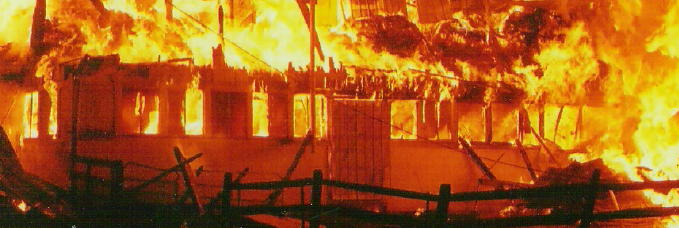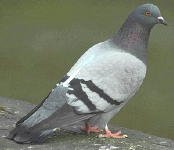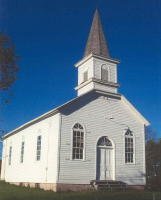|
|
A barn fire in the country is frightful and unforgettable. It can start from lightning, spontaneous combustion, or any of a dozen kinds of carelessness. Or by arson. Once started, a loft full of hay may as well have been set off by an incendiary bomb; there is no stopping it. But firemen, arriving ten or fifteen minutes later, do save nearby buildings. A fire at night is particularly spectacular and terrifying; it can warm the horizon with a red glow visible from ten miles away. It can launch a child's nightmares for months. How are parents to deal with that? Maybe they shouldn't stare at it while it's happening, biting hard on their knuckles? They shouldn't mention how many cows or horses they think are in that barn? The closest to home, and one of the most dazzling, was Leon's barn — right next door by country measure. Home for Thanksgiving vacation, I was playing ping-pong in the living room when we noticed flames spouting through that barn's roof. We were soon in the yard there, with many spectators and a troop of helpless firemen, all watching an incredibly huge fire that fell, eventually, into the barn's lower level. Leon himself had moved to Portville and had left tractors in there, and barrels of oil or other inflammable, or perhaps only tractors with full gas tanks. Anyway, in addition to the big blaze, there arose sudden huge overbursts of flame. Mom, our family's Sunday painter and latter day Nero, stayed home and painted the conflagration as seen from our front porch. A bit paranoid at the time, I'm thinking: might people be wondering whether it was a coincidence that I just happened to be home from Cornell for a few days — arson by Kenneth? Yes and no, stay tuned. Leon had been the local itinerant bailer and thresher, towing his machines around the neighborhood for a half-day or day-long gig here and there. Once he came to bail our straw out back with his bailer and its jerry-mounted engine on the front end. My friend Allen and I were watching as a small flame lit wisps of straw by the engine's spark plugs. Leon swatted at it with his cap, but didn't manage to put out the flame. Pa shouted for us to bring the chickens' water pails, and off we ran. As Allen and I were carrying them, a pail in each hand, strenuous for nine-year olds, we agreed that tomorrow we'd be heroes. Leon managed to tow the bailer out of the spreading fire proper, and the water helped to limit the fire to the straw pile. But the next day brought not glory for our effort, only a quiet visit from an insurance guy. No fame, not the least bit, for us young heroes. The Butterfield's barn in East Concord was one of the bigger fires, mostly hay, but a much larger building. Again, a spectacle that lit up the night. Nothing could be done for the barn. My sibs and I drove to within a quarter mile, sat on a small hill, and watched. There's not much anyone can do in that situation. But there's also no way to not watch such a terrible thing. Another night, we watched a fire in a different neighbor's woods. His maple-sap-boiling hut was afire. We never learned, maybe no one did, just what had caused it. One suspects an over-stoked fire left to burn itself out, or maybe loose rags or tinder too close to not-quite-dead embers. In this case there was no the danger to people or animals, nor fear of the fire spreading through the snow. Yet in the black of night, it's hypnotically awesome to see a structure that you've been in, now half flame and half silhouette, flickering and slowly piecewise crumbling. The Luce house, our country teacher's parents' house, burned during the daytime. Pa and I went to help; Pa managed to save a stove by unhooking it and joggling it out before the fire go to the kitchen. My big contribution of the day was to point out to the firemen that one of their trucks was stepping on a fire hose. My most helpless feeling arose when I was looking up through a second floor window into an open closet full of neatly hung clothes, captive beyond redemption, that within ten minutes would be totally engulfed in flames.
The other scare was mine, while working with Grosspapa. He was helping me make a loft for my pigeons high up in our black barn. We were just above the chickens' straw-supported-by-chickenwire "ceiling" when I suddenly realized that Grosspapa was smoking his pipe. I said, for God's sake (or some such) Stop smoking your pipe here right next to that straw! He did stop, of course. The barn and chickens, and possibly we ourselves, might have been consumed. Already quite a list of fires, I'm thinking, but there were more, a half-dozen more. One night Pa and Ma are driving home, from a visit to Uncle Charlie, when they see that chilling warm glow in the sky ahead, and Pa starts driving "like crazy" Ma later said. Is it one of our buildings? No, we weren't the victims that night; it was a barn two farms down. There were, for sure, deliberate burnings going on, all around us, Leon's barn undoubtedly one of them. In all cases, an abandoned or unused building, usually a barn. Obviously arson, catching the arsonist took quite some time.
|

 At
home, we had two scares, one involving the wood-burning stove in the
dining room. It had a separate outer sheet metal casing on which Pa
would pile the next morning's firewood to dry out; one night the wood
caught fire. I slept through the commotion, learning only in the morning
that Pa woke up, and managed to douse the fire raging above the stove.
He never again dried firewood that way, even though the high grill never
got too hot to touch. We never figured out how that blaze started.
At
home, we had two scares, one involving the wood-burning stove in the
dining room. It had a separate outer sheet metal casing on which Pa
would pile the next morning's firewood to dry out; one night the wood
caught fire. I slept through the commotion, learning only in the morning
that Pa woke up, and managed to douse the fire raging above the stove.
He never again dried firewood that way, even though the high grill never
got too hot to touch. We never figured out how that blaze started. It
turned out to be your typical fireman-arsonist story. The volunteer
fireman was finally suspected because of his ever presence and his mildly
agitated behavior at fires. The fellow had learned about, or invented,
a kind of fuse to get something started in the afternoon; it smoldered
for hours before flaming up that evening or night. It did turn out to
be, in fact, arson by Kenneth! But a different one, Kenneth V, not Kenneth
K. Cozier yet, he had been a classmate of mine for a while, at the East
Concord Sunday school. Nice guy, friendly, peasant, smiling, congenial.
(Maybe even religious, but in Sunday School, of course, no one can tell.)
Who ever would have suspected him? Not me.
It
turned out to be your typical fireman-arsonist story. The volunteer
fireman was finally suspected because of his ever presence and his mildly
agitated behavior at fires. The fellow had learned about, or invented,
a kind of fuse to get something started in the afternoon; it smoldered
for hours before flaming up that evening or night. It did turn out to
be, in fact, arson by Kenneth! But a different one, Kenneth V, not Kenneth
K. Cozier yet, he had been a classmate of mine for a while, at the East
Concord Sunday school. Nice guy, friendly, peasant, smiling, congenial.
(Maybe even religious, but in Sunday School, of course, no one can tell.)
Who ever would have suspected him? Not me.